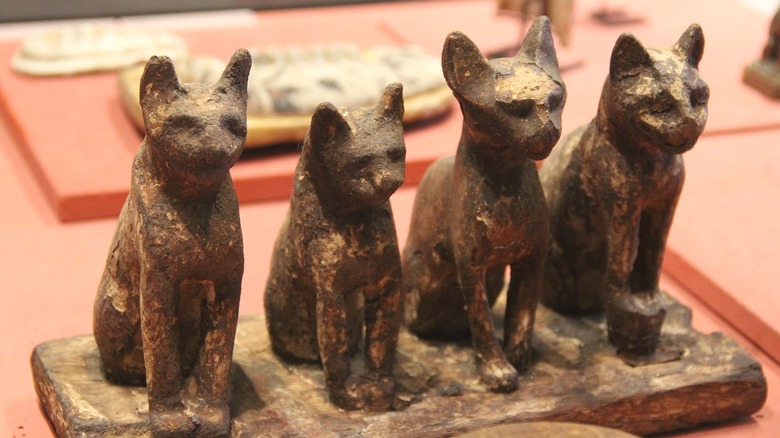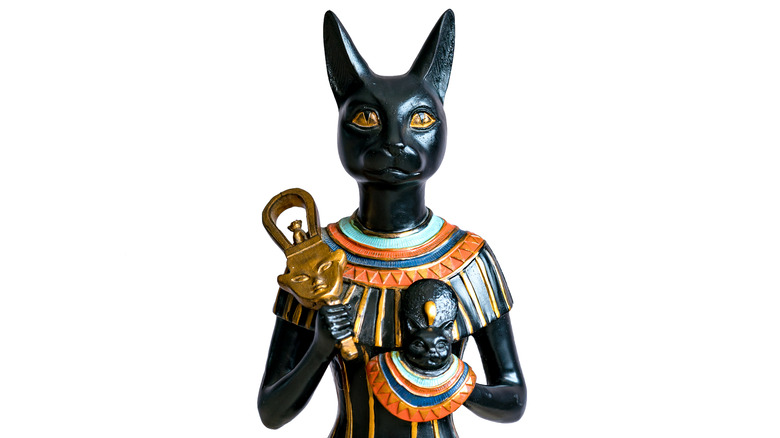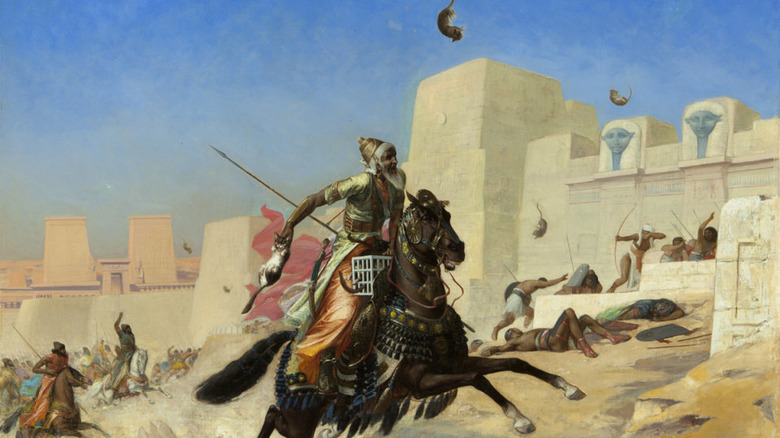How Persians Once Used Cats To Defeat The Egyptian Army
Ancient Egypt is remembered as one of the most powerful empires to ever exist on Earth. So who would've guessed that the mighty Egyptian army could be defeated by a herd of cats?
That's not exactly what happened, but it's not far from it. As World History Encyclopedia reports, the story begins in the 500s B.C. The Egyptian empire was on the decline; it was still a regional power, but certainly not as strong as it had been during its glory days under pharaohs like Tutankhamun and Ramesses. In fact, in the 600s B.C., Egypt suffered numerous devastating defeats at the hands of the Assyrian army, but ultimately succeeded in repelling them.
Seeing Egypt's weakened state, the Achaemenid Empire — better known as the Persian Empire, centered in modern-day Iran — decided it was time to make a move. According to Herodotus, a Greek historian, tensions between Egypt and Persia reached a tipping point when Amasis II, the leader of Egypt, refused to give his biological daughter as a wife to Cambyses II, the leader of Persia. More than likely, Cambyses used this dispute as an excuse to attack Egypt, and would have done so anyway.
While Cambyses was gathering his forces, Amasis died, leaving Egypt under the control of his son Psamtik III. While Psamtik had little political or military experience, he did his best to gather up a counter-campaign, and prepared to repel the Persian invaders at the city of Pelusium on the northern Nile.
Ancient Egyptians were extremely fond of cats
That's how things stood as of 525 B.C. Before getting into what happened next, it's important to understand a key detail: Egyptians loved cats.
To an extent, Egyptians loved all animals; World History Encyclopedia reports that the Egyptian diet was primarily vegetarian as a result. But cats were a particular favorite in Ancient Egypt, partly due to their association with the cat-headed (and sometimes cat-bodied) goddess Bastet. Per World History Encyclopedia, Bastet was the goddess of "the home, domesticity, women's secrets, cats, fertility, and childbirth," and was one of Ancient Egypt's most revered deities.
Bastet was equal parts protector and ruthless avenger. As a result, Egyptians treated cats with the utmost respect, fearing the rage of Bastet. Herodotus recounts that Egyptians would frequently put themselves at risk in order to save cats from house fires, and there are numerous instances of cats being mummified with jewelry and adornments befitting a pharaoh.
And the biggest evidence for Ancient Egypt's love of cats? The legal punishment for killing a cat was death.
Persians used the Egyptian love of cats to their military advantage
As Pharaoh Psamtik III prepared to defend Egypt from the advancing Persian forces, the Persian army did something completely unexpected. Per World History Encyclopedia, our best — and possibly exaggerated — account of the battle comes from Polynaeus, another Greek writer. According to Polynaeus, Persian leader Cambyses II ordered that the shields of each of his soldiers be painted with the image of the goddess Bastet. Then, Cambyses commanded his men to march into battle carrying (or following behind) a variety of Egypt's most beloved animals: dogs, sheep, ibises, and, most prominently, cats.
At that point, the Egyptian defenders were staring down an invasion of cats flanked by images of their cat-goddess Bastet. Naturally, the Egyptians were terrified of fighting back, as firing a single arrow put them at risk of injuring a beloved cat and invoking Bastet's wrath. Unsurprisingly, most chose to flee rather than stay and fight.
The Persian tactic was a major success. According to Egypt Tours, Herodotus reports that 50,000 Egyptians died at the Battle of Pelusium, compared to only 7,000 Persians. The Persians went on to capture Pharaoh Psamtik and conquer the rest of Egypt.
Per World History Encyclopedia, this was essentially the end of Egypt as an autonomous empire. Besides a few brief periods of sovereignty, Egypt spent the following centuries under the control of the Persians, then the Greeks, then the Romans. Who knew that a few felines could topple one of Earth's strongest empires?


